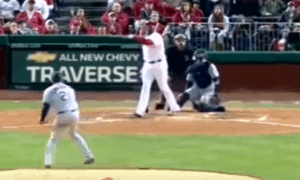

And his name isn’t Rhys Hoskins.
That is, if you go back to 2005. The prospect was Ryan Howard, the second-greatest power hitter in 134 years of Phillies history. The Phillies already were committed long-term to Jim Thome, who was everything the Phillies wanted and more when they signed him to big money before the 2003 season. Howard was just a home-run hitting machine who was blossoming before the Phillies’ brass eyes in 2004 when he hit 46 home runs in two minor league stops, and added two more in a September call-up. Then in 2005, the Phillies ticketed him back to Scranton when everyone knew he was ready for the show.
In 2017, Rhys Hoskins looks like a 2005 Howard clone. He’s stuck in Allentown after hitting 38 home runs for Reading in 2016, blocked by an adjusted plan that once slotted Tommy Joseph as the Catcher of the Future, but now peg Joseph as The Guy Who Gets First Crack at Being the First Baseman of the Future. After the cries for Hoskins reached a fever pitch at the end of April with Joseph more than 20 points below the Mendoza line, those cries have been quieted since Joseph has tore it up in May (1.016 OPS). Even backup Brock Stassi has likely earned some extra “prove it” time with decent play since he started the year hitting .111 through April 19.
In 2005, in 61 games in Scranton before his call-up when Thome got hurt, 25-year-old Howard slashed .371/.467/.690 for an OPS of 1.157.
In 2017, 24-year-old Hoskins has played 50 games with a slash of .315/.415/.643/1.058. Not quite Howard’s numbers, but awfully close, and you see where this is headed.
The comparisons don’t end there. Both were high-upside, fifth-round draft picks at lesser-known colleges (Southwest Missouri State for Howard, Sacramento State for Hoskins) that fell in the draft because they didn’t quite have the other tools after the power. Both are 6-foot-4, though Howard had a little more girth at 250 pounds vs. 225 for Hoskins. Howard turned himself into a kinda-sorta passable defensive first baseman, and he rarely got himself out on the bases. Hoskins is known to have a slick glove, but he won’t be beating Billy Hamilton in any 40-yard dash competitions. He’d probably be lucky to nose-out Cameron Rupp.
Both have a propensity to strike out during their minor league time. Howard’s minor league strikeout rate before he stuck in the show was 20.2, Hoskins currently sits at 21 percent. Both have also showed a knack to be patient, as Howard’s walk rate in the minors was just under 9 percent, while Hoskins stands at 12.2 in an era where walks have become far more important — in baseball and within the franchise — than they were when Howard was making his way through the minors.
This is neither a call for Hoskins to be brought up, nor is it an invitation to put unrealistic expectations on Hoskins to live up to the massive shadow Howard will cast over first base at Citizens Bank Park for at least two generations.
It just shows the precedent that Hoskins isn’t the first guy in baseball history to be blocked in the minors for whatever the reason might be. He’s not even the first for the franchise. He’s not even the first for the franchise in its recent history. It seemed to work out OK for the Phillies with Howard, and would be just as sweet is Hoskins could give three-quarters of the production Howard gave for 10 years.
Let’s just leave it with keeping a prospect in the minors for extra seasoning is a somewhat uncomfortable position for everyone involved, but it isn’t the worst thing in the world. It’s probably worth noting that two other members of that 2005 Red Barons team were Shane Victorino and Carlos Ruiz, two of Howard’s BFFs during the Golden Era, and maybe Hoskins is forging those kinds of friendships in Allentown.
#JustSayin.